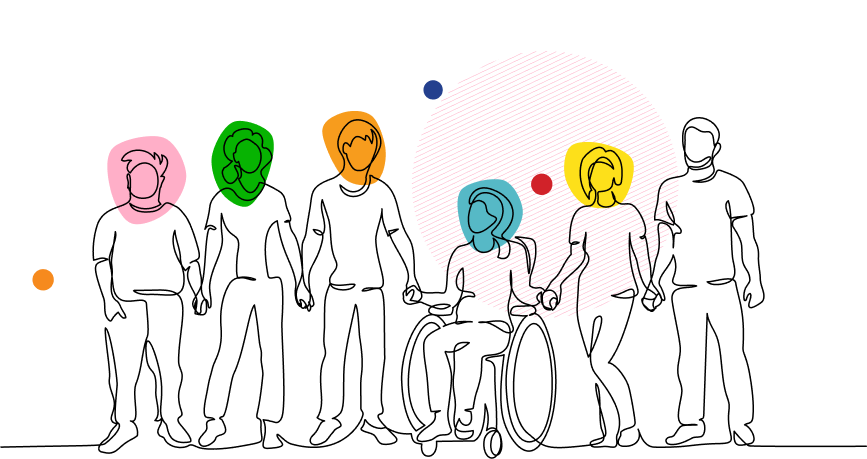A new study from the Williams Institute at UCLA School of Law, in collaboration with the Point Foundation, the nation’s largest LGBTQ+ scholarship nonprofit, finds more than twice as many LGBTQ+ POC as white LGBTQ+ adults report that unfair treatment at school due to being LGBTQ+ was a barrier to their academic success (10% vs. 4%). Lifetime anti-LGBTQ+ bullying, harassment, and unfair treatment also kept them from getting the amount of education, training, or degrees that they wanted (15% vs. 7%).
Fewer LGBTQ+ people of color have completed a postsecondary degree or certificate by the age of 25 compared to their white LGBTQ+ peers (56% vs. 70%).
Using data from the Access to Higher Education Survey, a nationally representative study of adults ages 18 to 40, researchers examined the school experiences and higher education environments of LGBTQ+ people of color.
Results show that one-third (33%) of LGBTQ+ people of color received little or no information about college applications from high school counselors and teachers. More than one-third reported that they received little or no information about college entrance exams (41%), letters of recommendation (48%), or financial aid (41%).
"Our research shows that more LGBTQ+ people of color experience bullying, harassment, and assault in community college and four-year college than their non-LGBTQ+ peers of color, and at similar levels as white LGBTQ+ students. We also found that more LGBTQ+ people of color are first-generation college students and come from families that had fewer economic resources,” said lead author Kerith J. Conron, the Blachford-Cooper Distinguished Scholar and Research Director at the Williams Institute. “This means that colleges and universities need to improve educational environments and ensure that resources and support are in place for LGBTQ+ students of color—during the application process and upon admission.”
“Places of higher education are letting our students of color down,” said Jorge Valencia, Point Foundation Executive Director and CEO. “This study shows us that LGBTQ+ people of color are supported by their communities to achieve their educational dreams, but when they get there, students face mistreatment that hinders their mental health and ability to succeed. We need schools across the U.S. to make a stand for the success of our students of color.”
Read the full study on LGBTQ+ students of color in higher education.
ADDITIONAL FINDINGS
Socioeconomic Status and Parental Support
- More than a third (35%) of LGBTQ+ people of color said someone in their childhood home received public benefits, such as supplemental income and food assistance, compared to 24% of white LGBTQ+ people.
- LGBTQ+ people of color (34%) were twice as likely as white LGBTQ+ people (18%) to have parents with no more than a high school education.
- More than two-thirds (69%) of LGBTQ+ people of color were encouraged by a parent/guardian to go to college when they were in high school.
Bullying and Harassment
- More than a quarter of LGBTQ+ people of color faced bullying, harassment, or assault in four-year college—nearly twice as many as non-LGBTQ+ people of color (26% vs. 14%).
- LGBTQ+ people of color were twice as likely as non-LGBTQ+ people of color to say that they had heard slurs or negative comments about LGBTQ+ people in four-year college programs (36% v. 14%).
- LGBTQ+ people of color were more than twice as likely as non-LGBTQ+ people of color to say that they had heard slurs or negative comments about racial-ethnic minorities (43% vs. 16%).
Belonging and Outness
- LGBTQ+ people of color were more than three times as likely as non-LGBTQ+ people of color to pick a four-year college in a different city or state to get away from family (34% vs. 11%).
- LGBTQ+ people of color were four times as likely as non-LGBTQ+ people of color to select a college elsewhere in hopes of finding a more welcoming environment (18% vs 4%).
Mental Health
- More than a quarter of LGBTQ+ people of color (29%) said that their mental health was not good all or most of the time they were in college, compared to 13% of non-LGBTQ+ people of color.
- One-third of LGBTQ+ people of color in four-year colleges reported the presence of LGBTQ+-supportive counseling services or LGBTQ+-informed health services at their schools.
This study is part of a series of reports that analyze data from the Access to Higher Education Survey:
Federal Student Loan Debt Among LGBTQ+ People
Educational Experiences of Transgender People
Community College and the Experiences of LGBTQ+ People
Experiences of LGBTQ+ People in Four-Year Colleges and Graduate Programs
The Williams Institute at UCLA School of Law, a think tank on sexual orientation and gender identity law and public policy, is dedicated to conducting rigorous, independent research with real-world relevance.
Point Foundation (Point) is the nation’s largest scholarship-granting organization for lesbian, gay, bisexual, transgender, and queer (LGBTQ+) students of merit. Point promotes change through scholarship funding, mentorship, leadership development, and community service training.

